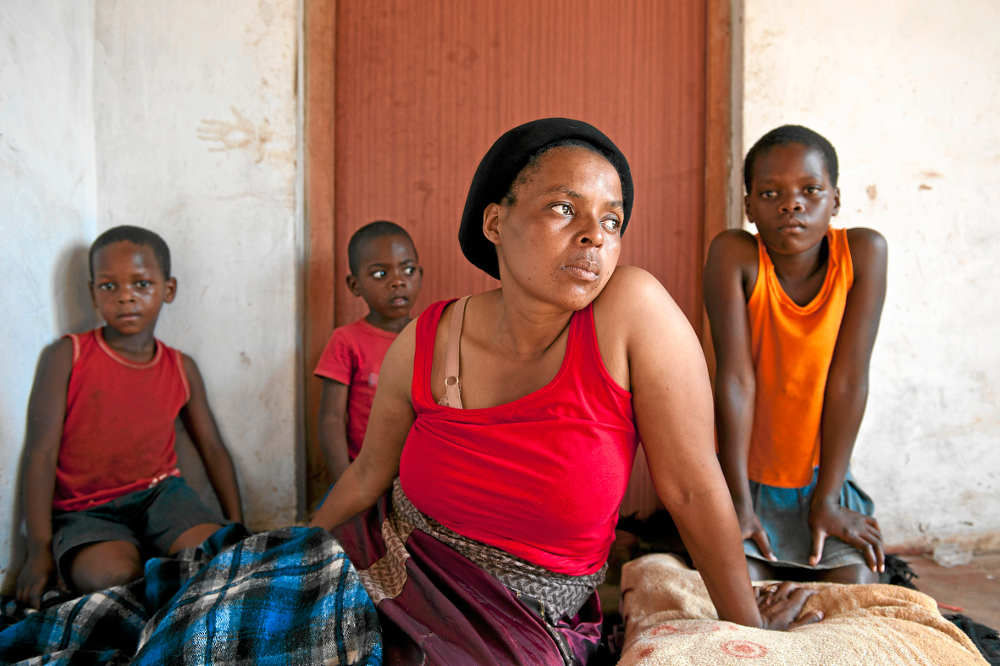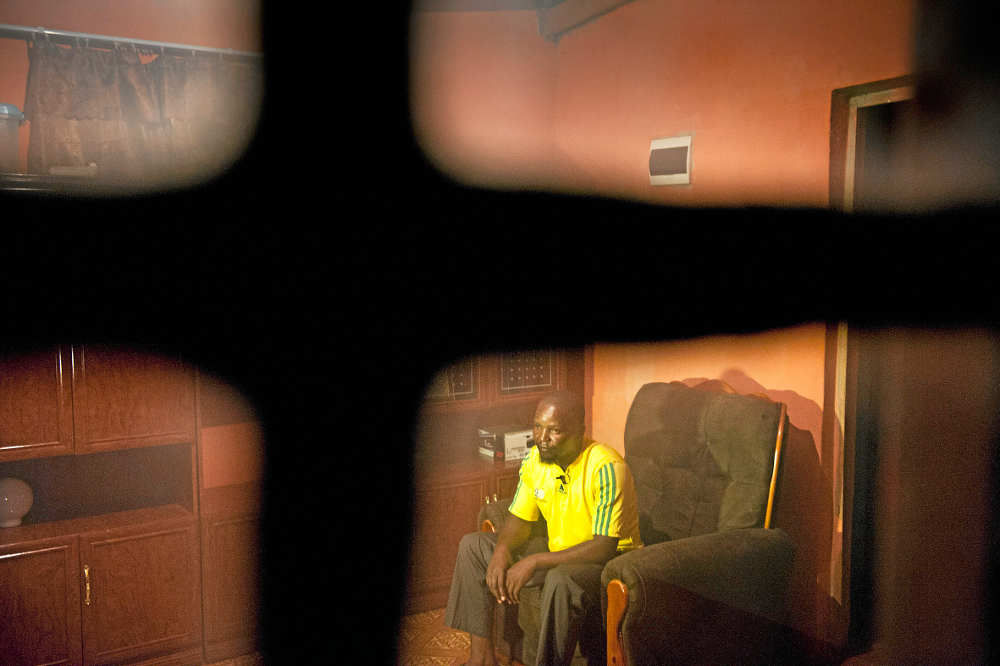Most villagers in eLuthulini
The trip to eLuthulini village in the Eastern Cape lives up to its name: eLuthulini means "place of dust".To get there, we travel inland on the R61 road from Mbizana. It is a disorienting journey: the gravel road seems to turn back on itself and it takes longer than one would expect. In eLuthulini there are no tarred roads; the houses are coated in dust.
We stop to pick up an elderly woman on her way to her home, a little farther down the road. She says many of the villages have never seen electricity or running water.
Off a side road, thick with bushy grass, on the veranda off the main house, lies Thembani Mthinti enjoying an afternoon nap. Her husband, Dumisani Mthinti, a Lonmin employee and a National Union of Mineworkers (NUM) shop steward, was killed on September 11 2012, as the strike wore on in the weeks after the Marikana massacre.
Discovered near the main koppie where a group of strikers were gathered, Mthinti had suffered "two open wounds at the back of his head like he had been hacked with a sharp object", according to a statement by the police.
The NUM contributed R20 000 to Mthinti’s funeral. The department of social development also apparently offered to deliver regular food parcels, but only two parcels have arrived since the funeral in September 2012.

Thembani Mthinti (far left) was left widowed, with four children to support, when her mineworker husband was shot dead at Marikana.
Her husband's provident fund only paid out R200 000. She gets child income grants for three of her four children, who are between seven and 15. The jarring pain of suddenly losing a husband has subsided but it still hovers, ghostlike. "I was very broken, but now it's better because the mine [Lonmin] is taking all of the children to the Woods Preparatory School and College in Port Edward."
'Not much has been done'
Mthinti says she is not aware of the exact circumstances surrounding her husband's death, "because I’m living all the way here", but she is willing to take up a mining job at Lonmin. The mine offered jobs to the family members of those who died during the strike.
"From the government's side, not much has been done for the families of the victims," she says, as her children gather around her inquisitively.
eLuthulini has no electricity and no running water – not even communal taps. "We get water from the spring," she says.
Mthinti says that, when the elections come around on May 7, she will vote ANC again, as she has done in the past. "We haven’t really seen the results of our voting because we are still waiting for electricity, but when they make promises they say they will electrify the place."
In eLuthulini, we see many people wearing NUM T-shirts. But many of those wearing them are either women or boys too young to work underground. Mthinti's neighbours, even those who bore the weight of breaking the news of her husband's death to her, say most people's gripes with the ANC in the area are over services.
A woman tells the Mail & Guardian that the area was once an ANC stronghold but the Democratic Alliance and Congress of the People has gained ground.
In Mbhobheni, a little bit closer to Mbizana, Vuyile Pato, the elder brother of deceased Lonmin mineworker Mvuyisi Pato, is home from Rustenburg because of the ongoing strike in the platinum belt.
"I want to leave that place," he says, seated on a couch in his father's house. "The conditions are not good." It is early evening, and Pato has just brought the family's sizable herd of cattle in from grazing.

Vuyile Pato believes the money spent at the Marikana commission of inquiry should rather have been distributed to the families of the victims. (Delwyn Verasamy, M&G)
We speak about this year's strike; at 10 weeks, it is the mining industry’s longest in recent years.
'The issue is money'
Pato's is a stock response among his Association of Mineworkers and Construction Union (Amcu) comrades: "The issue is money. The strike can't end until we have money. Even in 2012, we signed for money but we didn’t get it."
The conversation turns to the Marikana massacre of 2012, where his brother was killed by a shot to the back of his head.
"When people died like that, we saw that freedom hadn’t been won. It was like something that happened in 1976 or in 1960-something. We didn't expect it. The fact that they were finishing people off means that [the police] were out there murdering people."
Pato was on leave and at home at the time of the massacre. He says his family did not receive all the money that was due to them for the funeral from the municipality (R25 000) and his father had already contributed his own cows for slaughtering. He believes the money being spent at the Marikana commission of inquiry should have been distributed to the families of the victims.
But the massacre "didn’t change many people’s political allegiances" because "they don't know the story in detail".
"Even at home, it didn't change them, it only changed me," he says. "[President Jacob] Zuma and his government didn’t act like the other parties. [Julius] Malema came to grieve with us; the ANC kept their distance. Even during the anniversary of the event, everyone came – even the Inkatha Freedom Party came – but not the ANC. At that point it wasn't even political. It wasn't about workers leaving the ANC, but it was Malema and [United Democratic Movement leader Bantu] Holomisa who kept coming there and they started recruiting."
Asked how many colleagues have been "recruited", Pato says: "I can’t say … sometimes people are just happy to get the free T-shirts. One of the things about the NUM was that they hardly distributed T-shirts in the mines. They started doing it after Amcu was handing out T-shirts. But in the mines, a lot of people are with Holomisa. Had the ANC come to listen to the people, before the likes of Malema, people would have accepted them."
Pato has not decided whether he will vote, but he is not voting ANC.
In walks Malema
Malema has since made much of being the first political leader to approach the koppie at Marikana after the massacre. He launched the Economic Freedom Fighters (EFF) there; he lined up the widows of the deceased to sing and dance in party regalia at the movement’s election manifesto launch in Tembisa, Ekurhuleni, two months ago.
In the town of Mbizana, Malema's followers have recast his role in the aftermath of the massacre. The EFF's convener there, Mthuthuzeli Speelman, told the M&G Malema went to Marikana to "quell the violence" and "foster negotiations".
But Mbizana is a long way from Marikana and accounts of the event differ, depending on the storyteller.
Holomisa seems to be aware that the EFF is another challenger to his support base. He strategically supported the party’s launch in Marikana and the presentation of their manifesto.
Speaking to the M&G on the phone, Holomisa said he was wary of predicting any major losses for the ANC. But "of that 80 000 that are on strike now, I don't think the ANC will even get 70% out of that crowd".
According to Bheki Buthelezi, a Democratic Left Front activist based in Rustenburg, the ANC will feel the effects of Marikana, but what may lessen the blow is Amcu's stance of being an "apolitical" union.
"A lot of people go home to vote, This time many didn't register in their provinces because of the union's stance, which amounts to a lack of strategic thinking on the union’s part," says Buthelezi.
"Some people have lost interest in the political party and many first-timers didn't register. As a result, some will vote nationally, but won't be able to decide the province. There are some people who have been telling their families not to vote, and if they're voting, not to vote for the ANC."